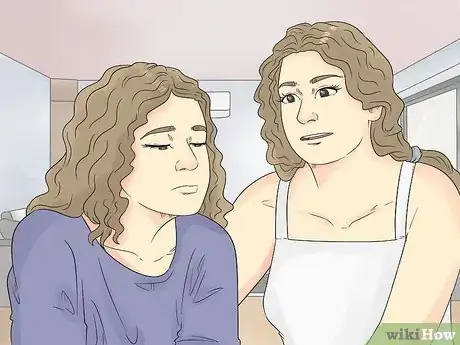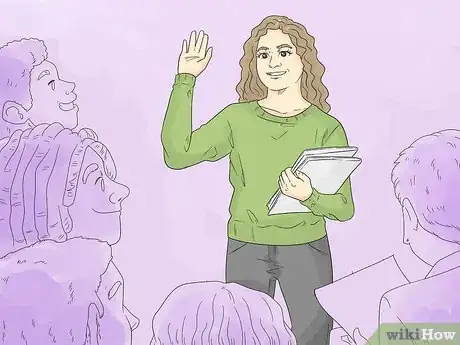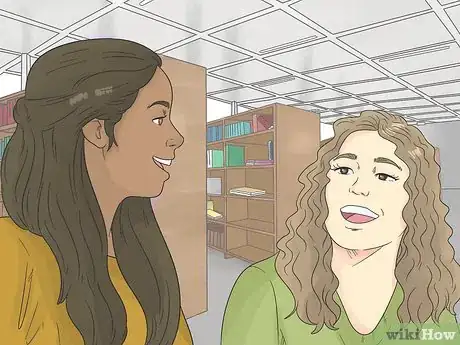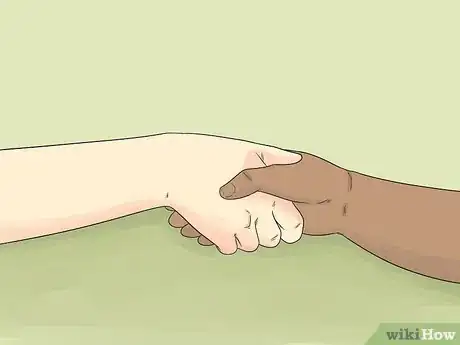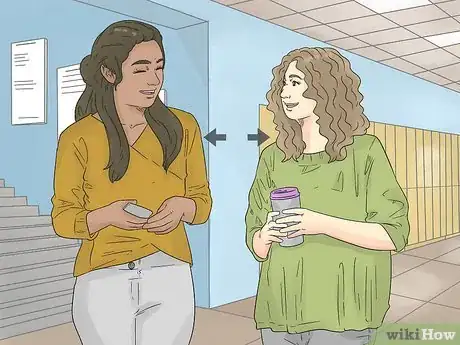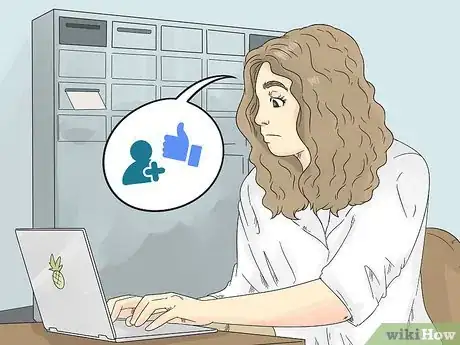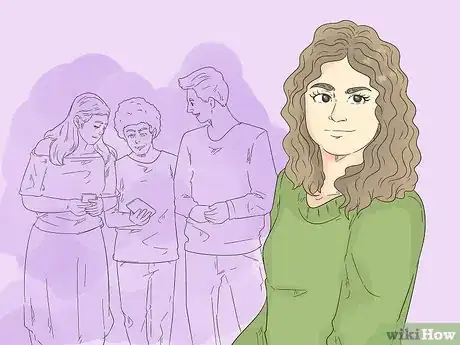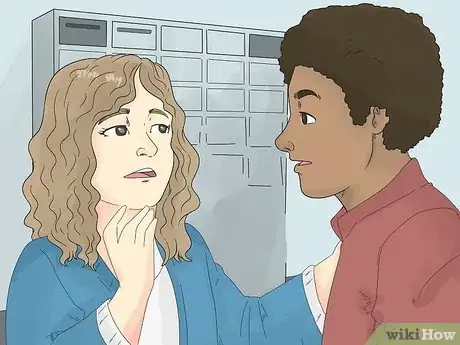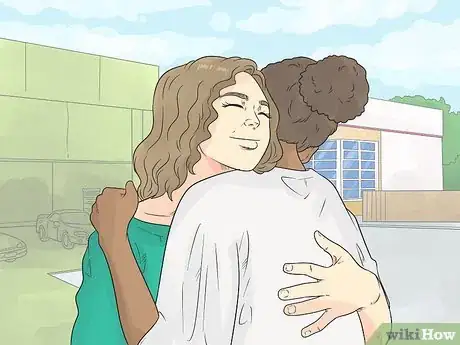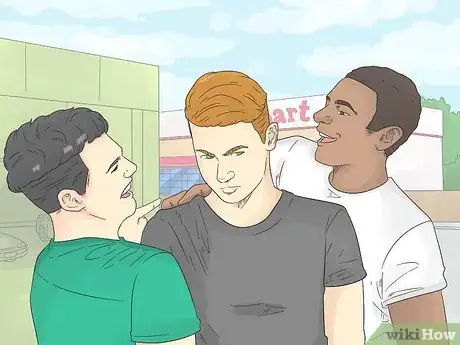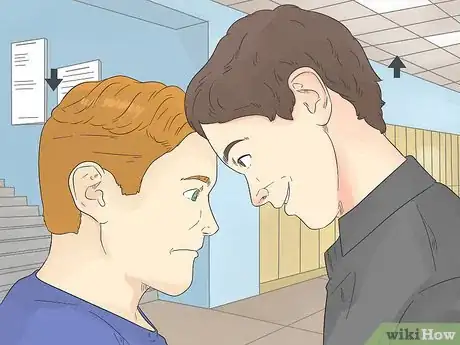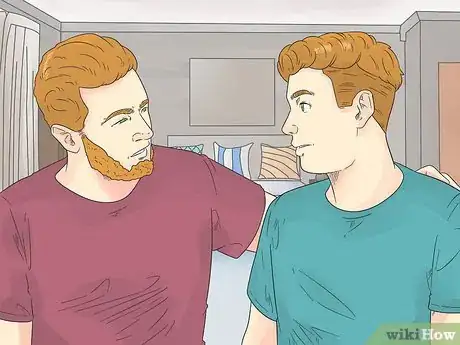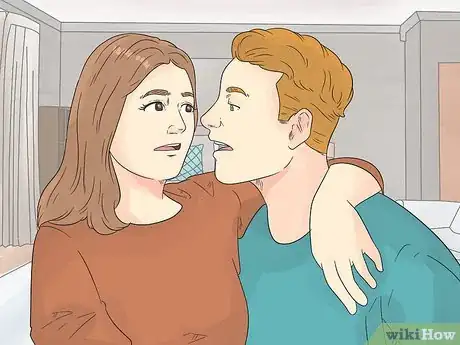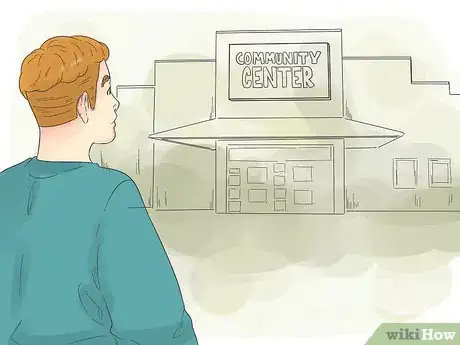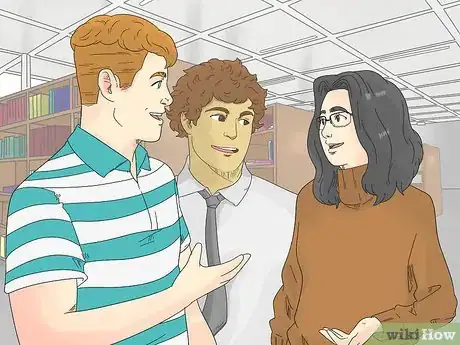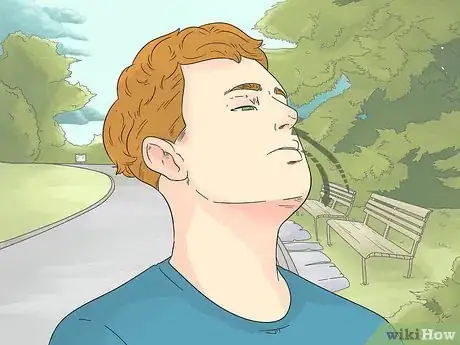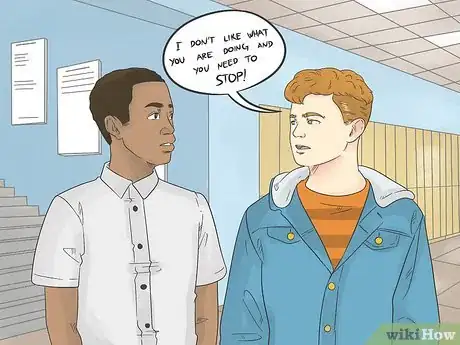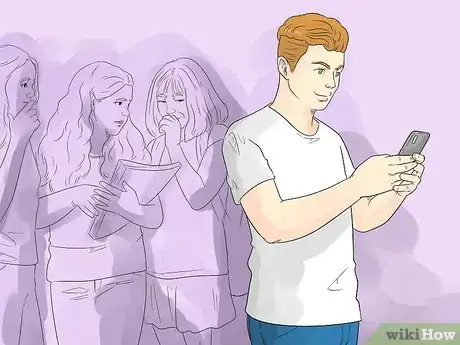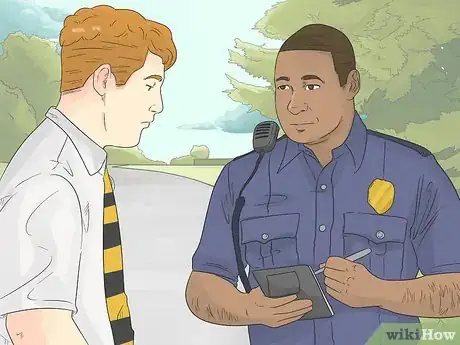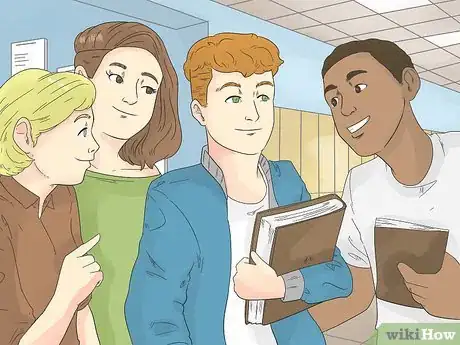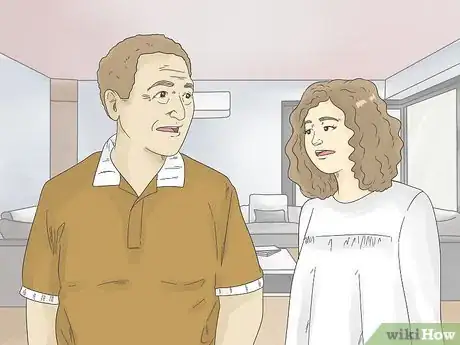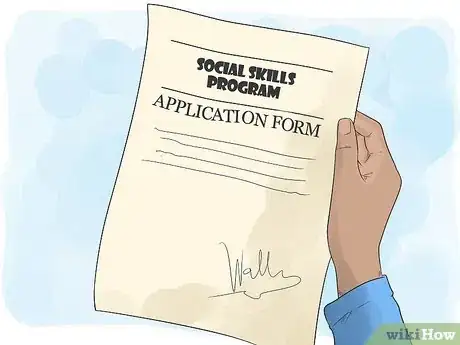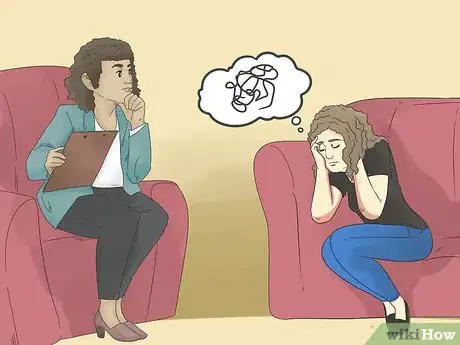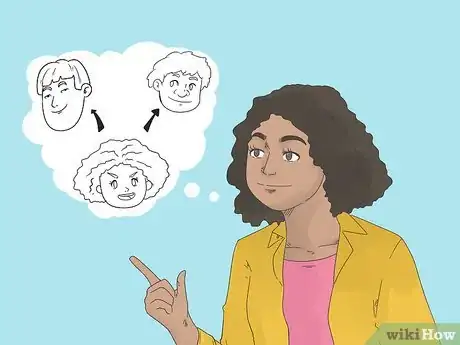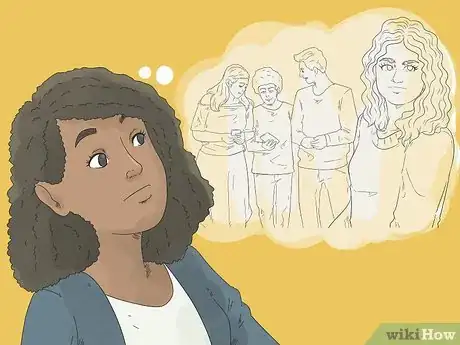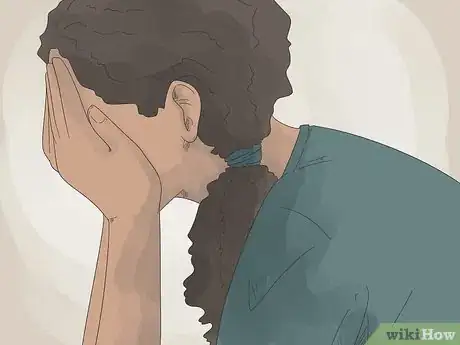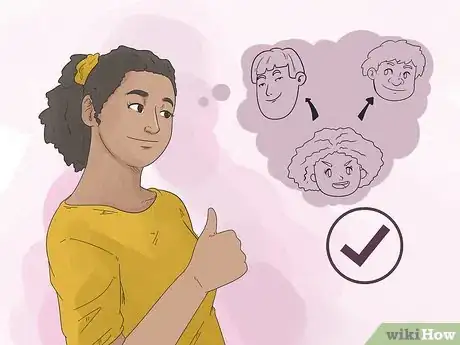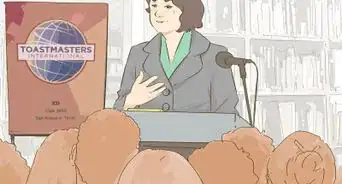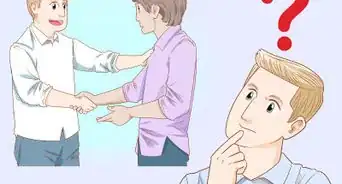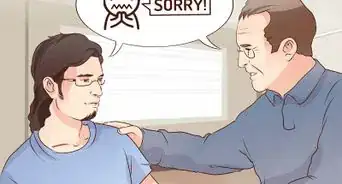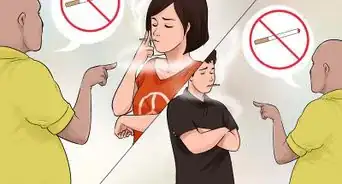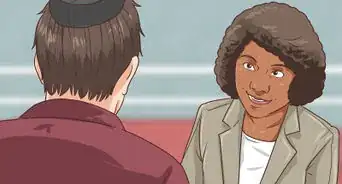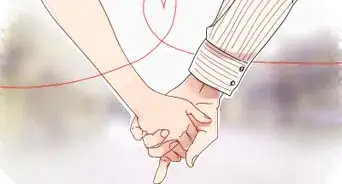This article was co-authored by Chloe Carmichael, PhD. Chloe Carmichael, PhD is a Licensed Clinical Psychologist who runs a private practice in New York City. With over a decade of psychological consulting experience, Dr. Chloe specializes in relationship issues, stress management, self esteem, and career coaching. She has also instructed undergraduate courses at Long Island University and has served as adjunct faculty at the City University of New York. Dr. Chloe completed her PhD in Clinical Psychology at Long Island University in Brooklyn, New York and her clinical training at Lenox Hill Hospital and Kings County Hospital. She is accredited by the American Psychological Association and is the author of “Nervous Energy: Harness the Power of Your Anxiety” and “Dr. Chloe's 10 Commandments of Dating.”
There are 8 references cited in this article, which can be found at the bottom of the page.
This article has been viewed 174,785 times.
Being a social outcast can be difficult, especially for children and teenagers. Lots of people go through a period of being on the social fringe; in fact, your experience is the stuff of some of the most poignant literature and movies ever created. Being ostracized is not your fault. Take heart in the knowledge that this time in your life will pass, and it gets better. In the meantime, there are things you can do to cope with social exclusion.
Steps
Coping with Social Exclusion
-
1Confide in a loved one. Although it can be difficult, it can help to find a supportive person in your life who will be a good listener, like your parents, a favorite teacher, or other loved ones. When young people are hurting because of their relationships with their peers, they should confide in supportive adults.[1]
- Talk about how you feel when you are excluded.
- Feeling like you are heard and understood can help make you feel better.[2]
- Talking to an adult will also let you know that you are not alone.
-
2Diversify your social options.[3] Cast a wide net in seeking friendships. Often when a person is a social outcast in one place, like in school, that person will be accepted in other places, like on a sports team.[4] Putting yourself in multiple settings will increase your chances of making friends.
- Doing multiple extracurricular activities that you like will give you more opportunities to make friends. It may even be easier to make friends through extracurricular activities because you will find other kids who share your interests.
- Focus on your interests.[5] Join a sports team, sign up for a theater troupe, take an art class, go to summer camp, or find another activity that you are genuinely interested in. Then focus on having fun and fostering your interests instead of just on making friends.[6]
- Raise your self-esteem. Through participating in extracurricular activities that you like, you will gain a sense of passion and purpose. Doing something you like and that you eventually become good at will raise your self-esteem. People with self-esteem are attractive to others, so learning to value yourself will help you to make friends.[7]
- Consider finding friends online. Seeking out people your age who share your interests is easier today than ever before. Look for web pages and clubs devoted to your interests. Just be sure to use the internet responsibly and with parental supervision.
Advertisement -
3Start small. Focus on making just one new friend to start. Having just one close friend has been shown to strengthen children's connectedness to school and to boost their self esteem.[8] The quality of friendships is more important than the quantity of friends someone has. One good friend is better than having ten acquaintances.
- Once you meet someone you'd like to be friends with, start a conversation with him/her.[9] Ask the person questions about him/herself or his/her interests, or chat about the activity you are both engaged in.
- After you've spoken to the potential friend enough that you are friendly acquaintances, invite the person to do something with you. This can be scary at first, but that is the only way to turn an acquaintance into a friend.[10]
- Get the person's contact information so that you can follow up with plans after you've invited the person to hang out.[11]
- Accept invitations that you get from potential friends.[12]
- Keep making plans and hanging out to let the friendship blossom.[13]
-
4Recognize that the end of a friendship is not failure. Relationships change constantly during the course of a person's life.[14] If a friendship ends, especially during your childhood or teenage years, it's a sad but inevitable part of life. It is not a failure. Accept that some friends will leave your life, but that creates an opening for you to make new friends.[15]
-
5Remain dignified and polite. Although it is normal for friendships to end, the way you end a friendship matters. The way you act toward people who are not your friends but who ostracize you also matters. Be the more mature person.[16]
- Follow this mantra: create distance with dignity. No matter what your former friends are doing, or how cold or exclusive they become, avoid angry exchanges.[17]
- Do not badmouth your former friends to others or online.[18] That will just make you look mean and may scare away potential new friends.
- In fact, do not to put much energy into the broken friendship or the people excluding you. Move on and shift your focus to all that is going right in your life, such as the new friendships and activities that help you feel good about yourself.[19]
-
6Resist obsessive FOMO (fear of missing out) behavior online. Spending a lot of time on social media, constantly reading other people's updates and obsessing about all of the fun things people are doing without you can lead to unhealthy FOMO (fear of missing out).[20]
- Realize that people make tend to embellish their lives when they post online. Your peers may not be as happy as they say they are. And even if they are, their happiness does not mean you cannot be happy also.
- Realize that virtual "likes" and "friends" are not the same thing as in-person friendships. You can be much happier with only a few good, real-life friends in your life than a person who has thousands of online followers.
- Disengage from unhealthy relationships on social media until you feel better.[21] Don't look at your peers' social media accounts for a little while. Instead, use the time you would have spent online to try new activities, focus on your interests, and make new friends in real life.
- Be careful about what you post online.[22] Whatever you post on the internet will be on there forever. Resist the urge to post unkind things about the people who are ostracizing you. Again, be the better person, and focus on your interests and potential new social groups than on the people who are excluding you.
-
7Don't take everything personally.[23] People are often so focused on their own problems and their own lives, especially during adolescence, that they aren't really focused on other people.
- The people excluding you may not realize that they are making you feel like a social outcast.
- Unless someone is actively mean to you, do not assume that he or she has malicious intentions toward you. Sometimes not getting invited to something is just an oversight.
- Maybe the person you think is excluding you actually thinks you are not interested in being friends with him/her. Unless that person is actively mean to you, consider being friendly to him/her. Maybe that person will become your friend.
- It gets better. Most social exclusion happens during adolescence, and most cliques disappear by the end of high school. Life gets better, and you will not always be a social outcast. Stay positive, and know that you are not alone.
-
8Stay true to yourself. Do not let what is "popular" discourage you from following your passions and from being your wonderful, unique self.
- True friends will respect your independence and unique personality.[24]
- Definitely do not let your desire to have friends outweigh your knowledge of right and wrong. Do not do anything you are uncomfortable doing just to make people like you.[25]
- Speak up when your friends are doing something wrong.[26]
-
9Be a good friend. People who enjoy true and lasting popularity are those who are good friends, whether they have one friend or one hundred friends.
Coping With Bullying
-
1Identify bullying. Bullying goes beyond simply being excluded from the group or normal teasing, and it is a serious problem. Bullying includes teasing that is hurtful, unkind, and constant.[29]
- Bullying is intentional tormenting and can involve physical, verbal, or psychological torment. It can range from hitting, shoving, name-calling, threats, and mocking to taking the victim's money or possessions, like taking a child's lunch money or sneakers.[30]
- Some kids bully by ostracizing others and spreading rumors about them.[31]
- Bullying can include using social media or electronic messaging to taunt others or hurt their feelings.[32] Cyber-bullying is increasingly common.
-
2Learn why bullying happens. Bullying occurs for many reasons. Sometimes bullies pick on other people because they need a victim to feel more important, popular, or in control.[33] Sometimes kids bully others because that is how they've been treated by other kids or by their families. They may think their behavior is normal because they come from families where everyone calls each other names or uses violence.[34] Sometimes bullies learn the behavior from popular culture, which makes them think that bullying is normal or "cool." Certain reality TV and internet sites show promote mean behavior.[35]
-
3Alert an adult. Bullying is not something you should tough out on your own. If you are being bullied, tell someone. Most schools and communities have anti-bullying policies. Notifying an adult will spur the adult to follow the procedures in place to stop the bullying. A parent, teacher, coach, principal, lunchroom attendant, or other adult can help you handle the bullying.[36] You are not alone.
-
4Confide in a loved one. Although it can be difficult, it can help to find a supportive person in your life who will be a good listener, like your parents, a favorite teacher, or other loved ones. When young people are hurting because of their relationships with their peers, they should confide in supportive adults.[37]
-
5Find safe haven. Identify at least five adults you can go to for help when you are being bullied. Find a place where you go to be safe from bullies, such as church, a community center, your home, etc.[41]
-
6Avoid the bully, and use a buddy system. Staying away from the bully and avoiding being alone can help in the short-term. Don't go where you know the bully will be, and try not be alone when the bully is present. Buddy up with a friend on the bus, in the hallways, at recess, or wherever the bully is. There is safety in numbers.[42]
-
7Remain calm. Bullies are encouraged to continue bullying when they provoke a reaction from the person they are bullying. Remain calm when you are bullied. Do not to respond to bullying by fighting or bullying back. It can quickly escalate into violence, trouble, and someone getting injured.[43]
- If you cry or become angry, it will make the bully feel more powerful.[44]
- Practice not reacting. It will take a lot of practice, but it useful to learn how to stay calm in an upsetting situation. Not reacting may eventually get the bully to leave you alone.[45]
- Cool down by counting to 10 or taking deep breaths. Sometimes the best thing to do is to wear a "poker face" until you are clear of danger.[46]
- Smiling or laughing at the bully may only provoke the bully more, so try to maintain a neutral, calm expression.[47]
-
8Set clear boundaries with your bully. Tell the bully that his/her behavior is inappropriate. Say something like, “I don’t like what you are doing and you need to stop,” or, “That is bullying and it is not right.”[48]
-
9Walk away. Firmly and clearly tell the bully to stop, then walk away. Practice ways to ignore hurtful comments, like acting like you are texting someone on your cell phone. By ignoring the bully, you're signalling that you don't care what he/she says. Eventually, the bully will probably get bored and will leave you alone.[49]
-
10Notify the authorities. If a bully physically attacks or hurts you, notify an adult and the authorities. Physical bullying is called assault and is illegal. Telling someone will ensure that the bully is punished and cannot hurt anyone else.
-
11Restore your confidence. Being bullied can hurt your self-esteem. Know that there is nothing wrong with you; the problem is with the bully.
- Spend time with friends who make you feel good about yourself.[50]
- Participate in clubs, sports, or other activities that you enjoy to build self-confidence, distract you from your negative feelings, and help you to build positive friendships.[51]
- Focus on the positive things in your life, and talk to someone about them.[52]
Seeking Help
-
1Tell an adult. If you are being bullied or are feeling unhappy in any way because you feel like a social outcast, tell an adult whom you trust. It will help you to talk about your feelings, and the adult may also know how to help you by helping you talk through your feelings and/or by stopping the bullying.[53]
-
2Consider enrolling in a social skills program.[54] If you have problems understanding social cues, making friends, dealing with social conflict, or any other social skills, ask your parents to enroll you in a program that will teach you social skills.
-
3Seek therapy. If you are depressed, anxious, struggling in school, have difficulty sleeping, are consistently sad or unhappy, or especially if you feel like harming yourself or others, speak to an adult and seek counseling/psychological therapy right away. Dealing with depression and bullying are not things that you should handle by yourself.EXPERT TIPChloe Carmichael, PhD is a Licensed Clinical Psychologist who runs a private practice in New York City. With over a decade of psychological consulting experience, Dr. Chloe specializes in relationship issues, stress management, self esteem, and career coaching. She has also instructed undergraduate courses at Long Island University and has served as adjunct faculty at the City University of New York. Dr. Chloe completed her PhD in Clinical Psychology at Long Island University in Brooklyn, New York and her clinical training at Lenox Hill Hospital and Kings County Hospital. She is accredited by the American Psychological Association and is the author of “Nervous Energy: Harness the Power of Your Anxiety” and “Dr. Chloe's 10 Commandments of Dating.”Licensed Clinical Psychologist

 Chloe Carmichael, PhD
Chloe Carmichael, PhD
Licensed Clinical PsychologistPractice mindfulness to work through your emotions. If you need help like therapy, always ask for it. When you can, practice mindfulness, too, even when you're not feeling emotionally overwhelmed. Start exploring yourself and your feelings so that you can name your emotions and better describe what's happening inside.
Learning Why Social Exclusion Happens
-
1Learn why being a social outcast hurts. Human beings are an intrinsically social species. Much of our species' success is due to our highly developed ability to cooperate and interact with each other. From an evolutionary standpoint, it is not surprising that instances of interpersonal rejection and social exclusion are negative experiences for individuals.
-
2Learn why social exclusion happens. There are many reasons why people exclude or ostracize others, so it can help to ask yourself why you are being excluded. Being excluded is not your fault, but it helps to understand how others think in order to learn how to make more friends. There are 4 main groups of people who are ostracized:
- People who hinder the group's operation. From an evolutionary standpoint, groups accept people who add something to the group. Those who hinder the group's operation can become excluded. Sometimes people are excluded because they are difficult to deal with. Other times, people are excluded simply for being different, and people naturally fear what they don't understand. The group has to learn to see this difference positively.
- People who are a danger to the group. Societies ostracize people who are aggressive, threaten the group's core values, who are untrustworthy, etc., as a way to protect the group.
- People who do not offer specific benefits to the group. Sometimes, a group feels that it already has enough members, so adding more will not add anything new to benefit the group. This isn't personal; the group just isn't interested in growing its members.
- People they are jealous of. If you have qualities that others don’t possess, like high intelligence, athletic ability, beauty, musical talent, self-confidence, or any other positive trait, your presence may remind them of what they are lacking. This can cause resentment. This is their issue, not yours.
-
3Know how social exclusion can be harmful. Being excluded socially has been linked to depression, anxiety, substance abuse, alienation, poor academic performance, suicide, and even mass killings. Social ostracism can also change brain function and lead to poor decision-making.[55]
-
4Know that social exclusion can also be beneficial. A recent study shows that social exclusion can sometimes be positive.[56]
- Social exclusion of independently minded people who are proud to be unique can validate their sense that they are not like everyone else. In these cases, social exclusion can help spur creativity for the independent thinker.[57]
- Being part of a clique may not always be fun. Cliques can be very stifling and may try to control how their members look, think, dress, and behave.[58] Not being part of a clique can help you to stay true to yourself and to develop true friendships that do not stifle your creativity or individuality.
References
- ↑ http://www.huffingtonpost.com/signe-whitson/what-parents-can-do-when-_b_6018308.html
- ↑ http://www.huffingtonpost.com/signe-whitson/what-parents-can-do-when-_b_6018308.html
- ↑ http://kidshealth.org/teen/your_mind/problems/cliques.html?tracking=T_RelatedArticle#
- ↑ http://www.huffingtonpost.com/signe-whitson/what-parents-can-do-when-_b_6018308.html
- ↑ http://kidshealth.org/teen/your_mind/problems/cliques.html?tracking=T_RelatedArticle#
- ↑ http://www.huffingtonpost.com/signe-whitson/what-parents-can-do-when-_b_6018308.html
- ↑ http://www.huffingtonpost.com/signe-whitson/what-parents-can-do-when-_b_6018308.html
- ↑ http://www.illawarramercury.com.au/story/1565518/helping-kids-cope-with-the-rejection-of-social-exclusion/
- ↑ http://www.succeedsocially.com/sociallife
- ↑ http://www.succeedsocially.com/sociallife
- ↑ http://www.succeedsocially.com/sociallife
- ↑ http://www.succeedsocially.com/sociallife
- ↑ http://www.succeedsocially.com/sociallife
- ↑ kidshealth.org/teen/your_mind/problems/cliques.html?tracking=T_RelatedArticle#
- ↑ http://www.huffingtonpost.com/signe-whitson/what-parents-can-do-when-_b_6018308.html
- ↑ http://www.huffingtonpost.com/signe-whitson/what-parents-can-do-when-_b_6018308.html
- ↑ http://www.huffingtonpost.com/signe-whitson/what-parents-can-do-when-_b_6018308.html
- ↑ http://www.huffingtonpost.com/signe-whitson/what-parents-can-do-when-_b_6018308.html
- ↑ http://www.huffingtonpost.com/signe-whitson/what-parents-can-do-when-_b_6018308.html
- ↑ http://www.huffingtonpost.com/signe-whitson/what-parents-can-do-when-_b_6018308.html
- ↑ http://www.huffingtonpost.com/signe-whitson/what-parents-can-do-when-_b_6018308.html
- ↑ http://kidshealth.org/teen/your_mind/problems/cliques.html?tracking=T_RelatedArticle#
- ↑ http://www.huffingtonpost.com/signe-whitson/what-parents-can-do-when-_b_6018308.html
- ↑ kidshealth.org/teen/your_mind/problems/cliques.html?tracking=T_RelatedArticle#
- ↑ kidshealth.org/teen/your_mind/problems/cliques.html?tracking=T_RelatedArticle#
- ↑ kidshealth.org/teen/your_mind/problems/cliques.html?tracking=T_RelatedArticle#
- ↑ kidshealth.org/teen/your_mind/problems/cliques.html?tracking=T_RelatedArticle#
- ↑ kidshealth.org/teen/your_mind/problems/cliques.html?tracking=T_RelatedArticle#
- ↑ http://kidshealth.org/parent/emotions/feelings/bullies.html#
- ↑ http://kidshealth.org/parent/emotions/feelings/bullies.html#
- ↑ http://kidshealth.org/parent/emotions/feelings/bullies.html#
- ↑ http://kidshealth.org/parent/emotions/feelings/bullies.html#
- ↑ http://kidshealth.org/parent/emotions/feelings/bullies.html#
- ↑ http://kidshealth.org/parent/emotions/feelings/bullies.html#
- ↑ http://kidshealth.org/parent/emotions/feelings/bullies.html#
- ↑ http://kidshealth.org/parent/emotions/feelings/bullies.html#
- ↑ http://www.huffingtonpost.com/signe-whitson/what-parents-can-do-when-_b_6018308.html
- ↑ http://www.illawarramercury.com.au/story/1565518/helping-kids-cope-with-the-rejection-of-social-exclusion/
- ↑ http://www.huffingtonpost.com/signe-whitson/what-parents-can-do-when-_b_6018308.html
- ↑ http://www.illawarramercury.com.au/story/1565518/helping-kids-cope-with-the-rejection-of-social-exclusion/
- ↑ http://www.illawarramercury.com.au/story/1565518/helping-kids-cope-with-the-rejection-of-social-exclusion/
- ↑ http://kidshealth.org/parent/emotions/feelings/bullies.html#
- ↑ http://kidshealth.org/parent/emotions/feelings/bullies.html#
- ↑ http://kidshealth.org/parent/emotions/feelings/bullies.html#
- ↑ http://kidshealth.org/parent/emotions/feelings/bullies.html#
- ↑ http://kidshealth.org/parent/emotions/feelings/bullies.html#
- ↑ http://kidshealth.org/parent/emotions/feelings/bullies.html#
- ↑ http://www.illawarramercury.com.au/story/1565518/helping-kids-cope-with-the-rejection-of-social-exclusion/
- ↑ http://kidshealth.org/parent/emotions/feelings/bullies.html#
- ↑ http://kidshealth.org/parent/emotions/feelings/bullies.html#
- ↑ http://kidshealth.org/parent/emotions/feelings/bullies.html#
- ↑ http://kidshealth.org/parent/emotions/feelings/bullies.html#
- ↑ http://www.huffingtonpost.com/signe-whitson/what-parents-can-do-when-_b_6018308.html
- ↑ http://www.illawarramercury.com.au/story/1565518/helping-kids-cope-with-the-rejection-of-social-exclusion/
- ↑ http://www.sciencedaily.com/releases/2006/11/061108154256.htm
- ↑ http://adigaskell.org/2012/09/15/when-being-an-outcast-can-be-a-positive-thing/
- ↑ http://adigaskell.org/2012/09/15/when-being-an-outcast-can-be-a-positive-thing/
- ↑ kidshealth.org/teen/your_mind/problems/cliques.html?tracking=T_RelatedArticle#
About This Article
Being a social outcast can be tough, but if you stay positive and talk to someone about it, you can start to feel better. Try not to take it personally if certain people don't want to be friends with you, since they might not even realize they're excluding you. If you feel lonely, try talking to people on forums, online chats, or video game servers. Don’t worry about trying to be someone you think people will like and just be who you are. You can also talk to someone you trust, like your parents, a teacher, or your school counselor about your feelings. If you’re being bullied, make sure you report this too, so they can help you deal with it. For more tips from our co-author, including how to improve your social skills, read on.
